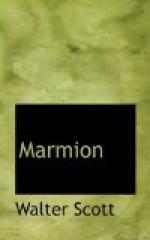’The spot from which Clara views the battle, must be supposed to have been on a hillock commanding the rear of the English right wing, which was defeated, and in which conflict Marmion is supposed to have fallen.’—Scott.
Lockhart adds this quotation:—’In 1810, as Sir Carnaby Haggerstone’s workmen were digging in Flodden Field, they came to a pit filled with human bones, and which seemed of great extent; but, alarmed at the sight, they immediately filled up the excavation, and proceeded no farther.
’In 1817, Mr. Grey of Millfield Hill found, near the traces of an ancient encampment, a short distance from Flodden Field, a tumulus, which, on removing, exhibited a very singular sepulchre. In the centre, a large urn was found, but in a thousand pieces. It had either been broken to pieces by the stones falling upon it when digging, or had gone to pieces on the admission of the air. This urn was surrounded by a number of cells formed of flat stones, in the shape of graves, but too small to hold the body in its natural state. These sepulchral recesses contained nothing except ashes, or dust of the same kind as that in the urn.”—Sykes’ Local Records (2 vols. 8vo, 1833), vol. ii. pp. 60 and 109.’
Stanza xxiv. line 717. ’Sir Brian Tunstall, called in the romantic language of the time, Tunstall the Undefiled, was one of the few Englishmen of rank slain at Flodden. He figures in the ancient English poem, to which I may safely refer my readers, as an edition, with full explanatory notes, has been published by my friend, Mr. Henry Weber. Tunstall, perhaps, derived his epithet of undefiled from his white armour and banner, the latter bearing a white cock, about to crow, as well as from his unstained loyalty and knightly faith. His place of residence was Thurland Castle.’—Scott.
Stanza xxv. line 744. Bent, the slope of the hill. It is less likely to mean the coarse grass on the hill—also a possible meaning of the word—because spectators would see the declivity and not what was on it. For the former usage see Dryden, ‘Palamon and Arcite,’ ii. 342-45:—
’A
mountain stood,
Threat’ning
from high, and overlook’d the wood;
Beneath the low’ring
brow, and on a bent,
The temple stood
of Mars armipotent.’




